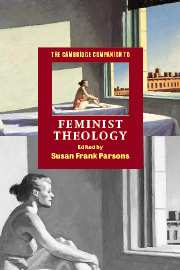Book contents
- Frontmatter
- Part one The shape of feminist theology
- 1 The emergence of Christian feminist theology
- 2 Feminist theology as intercultural discourse
- 3 Feminist theology as philosophy of religion
- 4 Feminist theology as theology of religions
- 5 Feminist theology as post-traditional thealogy
- 6 Feminist theology as biblical hermeneutics
- 7 Feminist theology as dogmatic theology
- Part two The themes of feminist theology
- Index
6 - Feminist theology as biblical hermeneutics
from Part one - The shape of feminist theology
Published online by Cambridge University Press: 28 May 2006
- Frontmatter
- Part one The shape of feminist theology
- 1 The emergence of Christian feminist theology
- 2 Feminist theology as intercultural discourse
- 3 Feminist theology as philosophy of religion
- 4 Feminist theology as theology of religions
- 5 Feminist theology as post-traditional thealogy
- 6 Feminist theology as biblical hermeneutics
- 7 Feminist theology as dogmatic theology
- Part two The themes of feminist theology
- Index
Summary
'In what sense feminist theology is a biblical hermeneutics will be the central focus of the piece.' The Editor's notes for contributors to this volume of essays provided this coup de grâce of a final sentence. To get the words 'feminist', 'theology', 'biblical', and 'hermeneutics' into one sentence raises a breath-taking number of problems of definition and appropriation for writer and reader alike. And when even apparently the most straightforward of these terms, that of 'biblical', opens as many questions as it closes, where can we possibly insert the can-opener to liberate what has become, for many women, a particularly poisonous can of worms? Even if we decide that canonical norms will be satisfactory for our purposes, are we dealing with the text(s) familiar to most Protestant readers, those with Old (or Former, or First) Testament texts based on the Hebrew canon taken over by Martin Luther and the other reformers? Or shall we base our analysis on the longer canon favoured by the Roman Catholic tradition, which incorporates the writings called apocryphal, or deutero-canonical by those who would not grant them a place in the authoritative list? And does it matter? Do these technical issues affect the ways that feminists can read, challenge, appropriate, hate, or be nourished by the texts that our institutions have sanctioned in some way? Or alternatively, do we move on, refusing even a minimalist level of authority for these patriarchally countenanced materials, and opt for a deliberate lack of answers, in an approach which affirms Alicia Ostriker's call for a hermeneutics of indeterminacy, insisting on the multilayered, contradictory indeterminacy of meaning in texts, and prefers to offer a range of readings of particular texts rather than the development of some kind of theoretical meta-narrative.
- Type
- Chapter
- Information
- The Cambridge Companion to Feminist Theology , pp. 97 - 113Publisher: Cambridge University PressPrint publication year: 2002



